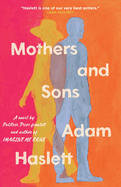
It's hard to conjure a novel that more skillfully addresses the idea of moral ambiguity than Adam Haslett's Mothers and Sons. The fact that the book's two main characters have dedicated their lives to honorable pursuits makes the story's central ethical conundrum all the more shattering.
It's March 2011 when New York immigration lawyer Peter Fischer, an out gay man, meets 21-year-old Vasel Marku, who is seeking asylum; an Albanian citizen, Vasel was the victim of gay bashing in Tirana. Threaded through Peter's narration are chapters from the perspective of his mother, Ann, a former Episcopal priest who runs a women's retreat in Vermont with her partner, Clare. Peter hasn't visited his mother in years, but working on Vasel's case, which requires extracting from the young man a harrowing account of violence and frayed family ties, will compel Peter to turn to Ann and revisit something that happened when he was a teenager.
With formidable restraint and characteristic grace, Haslett (Union Atlantic; Imagine Me Gone) probes a question that's best summed up by one of Peter's old clients: "Why do you--who has comfort and a job and a place to live--why do you do this work? What am I to you?" From the novel's beginning, which finds Peter holding forth in a courtroom, through its gutting, perfect ending, which finds him far from his professional orbit, Mothers and Sons considers what it means when people in need are meeting the invisible needs of those who serve them. --Nell Beram, author and freelance writer

